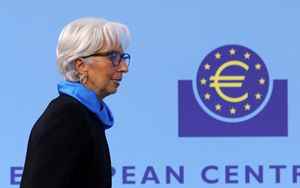(Finance) – The ECB yesterday confirmed interest rates unchanged and the possible withdrawal of QE measures by the third quarter, deouding a bit the markets, which were waiting for a more hawkish attitude. As a result, the euro plummeted to a two-year low against the US dollar as i comments by President Christine Lagarde confirmed that the ECB is in no hurry to raise interest ratesin contrast to the tightening of monetary policy by the Federal Reserve.
Basically Lagarde claimed that there is no clear timing for when rates start to rise and it could happen weeks or even several months after the end of the QE plan. The euro so it has depreciatedfalling as low as USD 1.075, the lowest level since April 2020.
Looking at analysts’ opinions, Intermonte talk about a “almost interlocutory meeting” from which emerges “a sort of taking time and postponing decisions in June “.” Lagarde gave ‘a blow to the barrel and one to the circle’, emphasizing both the upside risk for inflation and the downside risk for growth, underlining how the latest lending survey conducted among banks in the area, the intention to apply more restrictive credit standards in the coming months has emerged “, he comments Antonio CesaranoChief Global Strategist of Intermonte.
Annalisa PiazzaFixed-Income Research Analyst at MFS Investment Management, stresses that “the overall tone of the meeting is in line with the minutes of the March meeting which showed general consensus for an ongoing settlement withdrawal, as inflation risks are increasing and ECB officials feel the pressure to act. sooner rather than later “. “The tone of the press conference was well balanced – he adds – since the risks on the impact of the war in Ukraine have increased and the ECB wants to start the normalization without creating unnecessary shocks. Lending standards have tightened and will continue to strengthen in the coming months. “For Lagarde,” taking the path of early rate hikes would have too much impact on the real economy “and therefore a possible increase is confirmed no earlier than Q4. 2022.
“Hawkish yesterday, dovish today, tomorrow? Who knows. Compared to market expectations, the perception is that Lagarde was on the more dovish margin than expected today, not accelerating the end of QE”, he comments Pasquale DianaHead of Macro Research of AcomeA SGRconfirming that “in all likelihood we will see one or two rate hikes already this yearand someone to follow in 2023. The gap with Fed rates will continue to widen, given the different macro conditions “.” The biggest unknown in the coming months in our opinion is: how much fragmentation (read: widening of spreads) is willing to tolerate the ECB in this normalization process before intervening with new instruments? “, concludes the expert.
For Pietro BafficoEuropean Economist of abrdn“President Lagarde’s comments were overall less hawkish than the market expected after the surge in inflation in March” and “although this was already covered by the March meeting, it indicates even more clearly that the window for rate hikes is still open for the fourth quarter“.” Investors who were already considering more deposit rate hikes during the summer – he underlines – therefore had to revise their expectations. This was reflected in the market reaction, with the depreciation of the euro against the dollar and the decline in euro zone bond yields. “
“As expected, the ECB has left interest rates unchanged, but the rhetoric continues to be decidedly restrictive, with the reiteration of the end of QE in the third quarter of 2022. Also in Europe we see how the ‘forward guidance’ continues to aim at the control of inflation expectations with respect to providing reassurance on support for economic growth “, says Michele Morra, Portfolio Manager of Moneyfarm, adding” we do not know how much this resolve can last over time, especially in a context of inflation driven by commodity prices rather than by aggregate demand and in which fiscal policy will be called upon to support families and businesses “.
